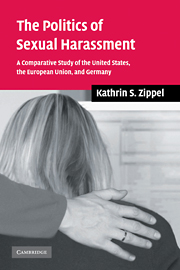 The Politics of Sexual Harassment
The Politics of Sexual Harassment Book contents
- Frontmatter
- Contents
- List of tables
- Preface
- List of abbreviations
- 1 Sexual harassment and gender equality
- 2 Equality through litigation: sexual harassment in the United States
- 3 Diffusion through supranational actors: sexual harassment in the European Union
- 4 The political path of adoption: feminists and the German state
- 5 “Good behavior versus mobbing”: employer practices in Germany and the United States
- 6 Social movements, institutions, and the politics of sexual harassment
- Appendix A List of cited interviews
- Appendix B Data collection
- References
- Index
3 - Diffusion through supranational actors: sexual harassment in the European Union
Published online by Cambridge University Press: 22 September 2009
- Frontmatter
- Contents
- List of tables
- Preface
- List of abbreviations
- 1 Sexual harassment and gender equality
- 2 Equality through litigation: sexual harassment in the United States
- 3 Diffusion through supranational actors: sexual harassment in the European Union
- 4 The political path of adoption: feminists and the German state
- 5 “Good behavior versus mobbing”: employer practices in Germany and the United States
- 6 Social movements, institutions, and the politics of sexual harassment
- Appendix A List of cited interviews
- Appendix B Data collection
- References
- Index
Summary
European Union Commissioner Anna Diamantopoulou, celebrating the passage of the directive on sexual harassment, announced at a press conference: “The general level of awareness of sexual harassment in Member States is very poor. Now sexual harassment, absent from most national laws today, will finally have a name” (Commission Press Release April 18, 2002). The 2002 Equal Treatment Directive passed despite the objections of several European member states and the European employers' associations. They had actively criticized the European Union's efforts to combat sexual harassment and long resisted it. They declared sexual harassment a culturally specific issue for which EU-wide regulations could not be developed, and sought to protect businesses against overregulation and additional costs. For example, a spokesman for the United Kingdom right/center Tory party explained: “Sexual harassment has got absolutely nothing to do with the EU” (Philip Bushill-Matthews, Member of the British Parliament, 2002). The Tories not only argued that the EU was intruding on domestic affairs but demanded the dismantling of the European Commission's Equality Directorate, arguing that this office had become “an engine of costly left-wing legislation that was plaguing business with rules and red tape” (Evans-Pritchard 2002).
The Commissioner had tried to convince businesses of the value of anti-harassment laws: “In my mind, the chief purpose of this directive is preventive … At the end of the day, a clear and predictable working environment free of sexual harassment is also in the interest of business itself”(Commission Press Release June 7, 2000).
- Type
- Chapter
- Information
- The Politics of Sexual HarassmentA Comparative Study of the United States, the European Union, and Germany, pp. 82 - 122Publisher: Cambridge University PressPrint publication year: 2006


